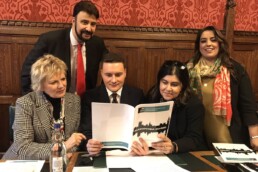We are increasingly privy to those who speak on our behalf in public – and this is why it must be addressed. It is not our place to sanction the right of people to have their personal opinions, but to speak as if one is learned on normative Islam or represents the Sunni orthodoxy we and our families ascribe to when even the most basic prerequisite such as knowledge of the Arabic language are amiss is either deep ignorance or simple hubris.
In the public realm, experience and acting responsibly are key issues, a lack of both drives individuals to act flippantly and speak out of turn. Upon the Prophet’s distribution of war spoils on the Day of Hunain some from the Ansar said: “May Allah pardon the Messenger of God; he apportions for the Quraish but leaves us out, whilst we are the ones who fought!” So after having gathered the Ansar in a tent the Prophet asked about what was said. “The fuqaha (learned and informed) of the Ansar replied: As for our heads (ru’us), Messenger of God, they said nothing. But there are people from us with ‘new teeth’ who said…” (Muslim) The term new teeth in Arabic denotes the young or those who lack experience and subsequent maturity. It is pertinent to note that it was the fuqaha of the Ansar who spoke, who clarified that the heads of the Ansar effectively knew when to remain quiet.
Now I hold it the right of every citizen to hold his or her opinions, and regard the demonisation of naïve or uninformed views unnecessary. But where lay Muslims address wider British society and use language that denotes their beliefs as being a normative view of God’s will for the modern world is not only wrong but also misplaced. The commonly put “our religion” or the “Islamic view” isn’t characteristic in the slightest, and the painting of Islamic theology and law in abstract binary terms – a body that sits on more than a millennium of nuanced judicious thought, evolving societal insights, and profound shar’i reasoning – demonstrates the outcome of a pervasive culture of sloganeering, a void of religious tarbiyyah (cultivation) and entrenched shar’i illiteracy.
An example of the audacity it has nurtured is the rudimentary renunciation of democracy or painting it as differing from the “Islamic system”. Such sentiment reveals a deeply flawed understanding of Islamic political philosophy, from what this nebulous Islamic system is to an actual understanding of democracy and its theories. As a note to Muslims it’s very simple: beyond a few notions that tend to be agreed on by nearly all political theorists, there is academic debate as to the exact nature of democracies and how they work. But the general sentiment of the sahabah is clear: a conspiracy to install an authoritarian regime after his tenure led Umar b. al-Khattab to rebuke autocracy and uphold the notion of governance by consent – a democratic mandate with the impartial rule of law (for which Umar was famed). Umar’s reaction was telling, “I shall inform the people that there are those who plan to usurp their political affairs!” Such was the understanding of all prophetic apostles; in his al-Tabaqat al-Kubra, Ibn Sa’d related the statement of Salman al-Farsi concerning governance which also intimated the difference between monarchic rule and democratic leaders. Now given that much of this political philosophy is intertwined with theology and Islamic law, scholars initiated discussions from theological paradigms, contributing to a theory of democracy, and holding it to be divine will that instituted democracy to replace the despotism and tyranny of Pagan Arab rule. Rather than merely affirming a theory of democracy there has been on-going development within Islamic juristic thought. So to assume that Islamic theology rejects democracy is clearly untrue and in complete contradiction to actual endeavours.
Now most Muslims aren’t to blame for being in the dark – seldom are they versed in political theory, theology, Islamic law or even the Arabic language; but those who hasten to stand in the media (or other outlets) are culpable for speaking to the country in a way that suggests millions of Muslims agree with them, or that they have arbitrarily acquired some scholastic authority to do so – it simply won’t do. An even greater harm is when misguided opinions legitimate the misinterpretations government repeatedly articulates to wider society. ‘British values’ are habitually used by the Prime Minister to juxtapose decency against a vague set of ‘Islamic values’ that he seems to have adopted from those given airtime or on YouTube rather than intelligent Islamic scholars. So after many of the Muslim performances we are growing accustomed to, it looks quite justified when the PM positions Islam as being anti-democratic, that somehow we would go for authoritarianism and tyranny. Or that we don’t believe in the rule of law – as if we prefer being governed by arbitrary decisions of individuals; and that we are intolerant of others – as if we believe God commands us to forcibly convert the rest of humanity. With their personal views superficially posited as normative Islam, these media (or populist) spokespersons fail to consider the implications of wider societal perceptions for what they put forward.
The confusion that often besets sincere Muslims is that they are offered reference points steeped in pre-modern political paradigms with Islamic concepts addressed in a rudimentary fashion. The paucity of learned and astute thinkers in the western world developing political theory to reflect modernity doesn’t mean it is not happening – what is frequently lost in polarised public debates is the failure to recognise that western Muslims are currently at a stage of maturation and evolution. Whilst there are some who fervently cling to their partially understood medieval concepts, their own confusion in attempting to make sense of their belief quickly becomes apparent. In an ironic bid to distance themselves from the more controversial aspects of their beliefs, they hasten away from the classical understandings they usually advance.
[blockquote align=”none”]This is not to say that religious orthodoxy must be diluted – far from it, but that our expression of modern religious conservatism must consider factors relevant to a post-industrial western society and the history of a millennium that has shaped it.[/blockquote]
Another issue that we must address is that as British Muslims who are born and raised in the UK we look, like others in society, to the past to make sense of where we are heading – to inform our aspirations and desires for a future that sees Muslims as an integral part of plural Britain. But for a post-immigrant community looking to a past that is removed from the historicity of the UK it can actually serve to confuse its place in Britain rather than enrich it. Muslim identity can either be one which is formed on the backdrop of an immigrant experience where an ethno-culture that has been influenced by Islam is brought into a western cultural context, or alternatively, by projecting Abrahamic monotheism on to wider western culture directly. For those committed to faith and revelation the latter will probably take precedence, and just as Christianity, which originated from the East, has over time has become a western religion, we might view it as a natural progression that the same happens with Islam. This is not to say that religious orthodoxy must be diluted – far from it, but that our expression of modern religious conservatism must consider factors relevant to a post-industrial western society and the history of a millennium that has shaped it.
To speak on behalf of God without a scholastic basis is the most profound offence and sure to result in ignominy: “yet still there are some people who, without knowledge, argue about God, who follow every devilish rebel fated to lead astray those who take his side.” (Q 22:34) It is to erroneously present God as having offered humanity half-baked and contradictory ideas. “Do not follow blindly what you do not know to be true; ears, eyes and heart: you will be questioned about all these.” (Q 17:36) For those who narcissistically believe they have a scholastic basis, all without even a basic command of the Arabic language or even a simple juristic understanding of worship (ibadah) speaks volumes. To contest the current neo-conservative campaign against British Muslims will require those with a thorough insight into theology, law and jurisprudence – all of which are consistently misrepresented by the government and right-wing media – together with cultural capital and political acumen.
Our interaction with the wider public is meant to serve as a means to getting them on board and not an opportunity to posture and sloganeer for Muslim brownie points and pats on the back from insular co-religionists. Understanding how these realms interact is of utmost importance to leadership in general, at least in a way that facilitates innovative contributions to society that are reflective of an intelligent Islam in western modernity. Sincerity is always valued, but we must learn something from prophetic warnings.
[blockquote align=”none” author=”al-Bukhari and Muslim”]…then the people will take the unlearned as their leaders, who, when asked shall offer responses without knowledge: they are misguided and misguide others.[/blockquote]




